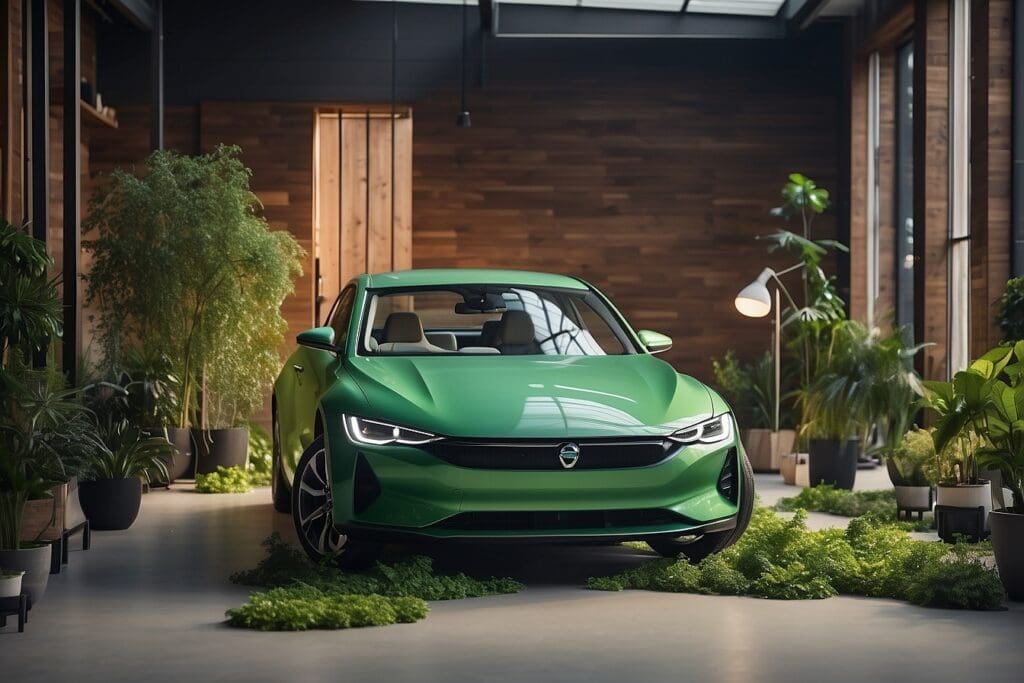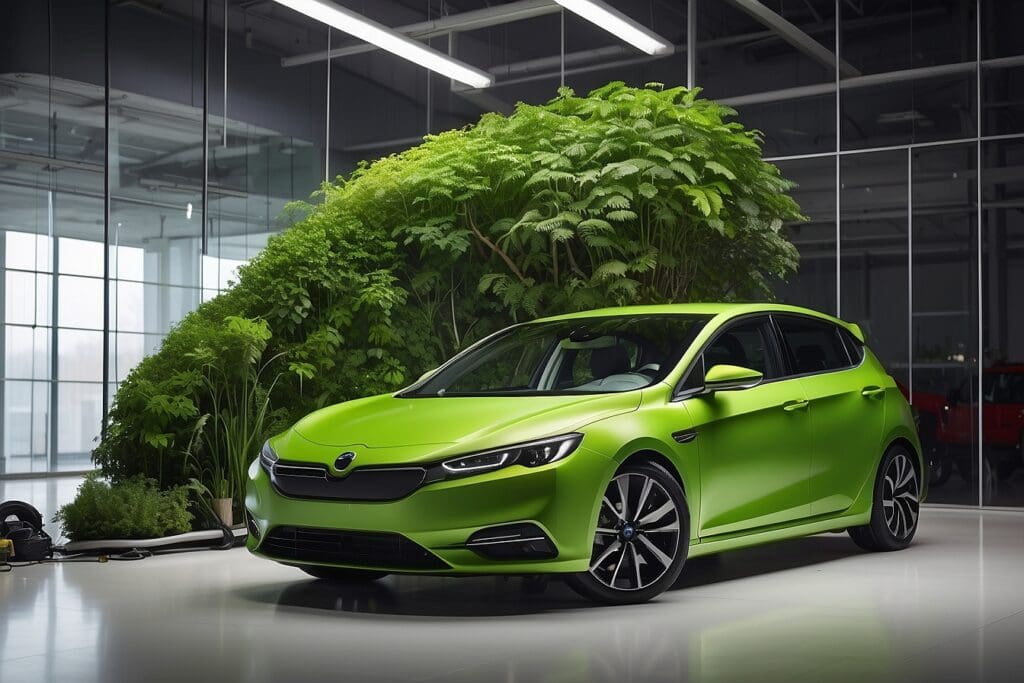We all see vehicles whizzing past us on a daily basis, but let’s be honest: they take quite a toll on our precious environment. Like many of you, we’ve not just sat back and shrugged; we’ve rolled up our sleeves to truly grasp this challenge—did you know that transport is responsible for roughly 24% of global CO2 emissions stemming from fuel combustion? But amidst this rather gloomy statistic lies a beacon of hope.
Our latest article shines a light on the emerging heroes in the green automotive sector – these pioneering start-ups are crafting innovative solutions that promise cleaner skies and roads.
Let’s join hands as we explore their journey towards an environmentally friendlier tomorrow!
Key Takeaways

- Green automotive startups are innovating with electric and hydrogen vehicles to reduce global CO2 emissions from transportation.
- Government regulations, changing consumer expectations, and key megatrends such as the rising demand for electric vehicles and advancements in autonomous driving technology are fuelling the growth of eco-friendly automotive companies.
- These startups are redefining the lifecycle of vehicles by using sustainable materials in production, improving maintenance during vehicle use, and promoting recycling at their end-of-life phase.
- Market growth potential is strong due to increasing environmental awareness among consumers and regulatory support for green technologies in the automobile industry.
- Overcoming challenges like financial constraints, infrastructure limitations, consumer acceptance, regulatory compliance, technological complexities, supply chain sustainability, and competition requires strategic planning and innovative solutions.
The Shift Towards Sustainable Solutions in the Automotive Industry
The automotive industry is undergoing a significant shift towards sustainable solutions, driven by government regulations, changing consumer expectations, and key megatrends. This has led to an increased focus on eco-friendly technology and the use of sustainable materials in vehicle manufacturing.
Government Regulations
We’re witnessing how government regulations play a pivotal role in the rise of green automotive startups. Governments around the world are setting stricter emissions targets, pushing car manufacturers to adopt more sustainable practices.
These policies encourage innovation and make room for new players who prioritise environmental impact and sustainability trends.
The introduction of incentives for electric vehicles and penalties for high-emission cars nudges both consumers and producers towards cleaner transportation options. This creates a fertile ground for eco-friendly automotive startups striving to meet these regulatory standards with groundbreaking green vehicle technology.
As regulations tighten, we can expect more breakthroughs that support our quest for a sustainable environment.
Changing Expectations
Consumer expectations of the automotive industry have shifted towards sustainable and eco-friendly options. People now demand vehicles that minimise environmental impact, promote clean energy, and offer sustainable transportation solutions.
This change in mindset has led to an increasing demand for green cars and alternative fuel startups. Additionally, environmentally conscious individuals are looking for innovation in the automotive industry that prioritises renewable energy and low-carbon vehicle options.
As a result, there is a growing need for green technology companies to deliver on these changing expectations by providing sustainable mobility solutions and incorporating ecofriendly materials into vehicle production.
The automotive industry has pivoted towards meeting changing consumer demands by focusing on the development of electric vehicles and hydrogen engines while implementing sustainable practices in car manufacturing.
Key Megatrends
After discussing the changing expectations in the automotive industry, it’s essential to understand the key megatrends driving the shift towards sustainable solutions. These trends shape the future of green automotive startups and influence consumer choices. Here are the key megatrends shaping the green automotive landscape:
- Rising Demand for Electric Vehicles: The growing consumer interest in electric vehicles is propelling innovation in battery technology, charging infrastructure, and range capabilities.
- Advanced Driver Assistance Systems (ADAS): The integration of ADAS features such as automated parking, collision avoidance, and adaptive cruise control aligns with the push for safer and more sustainable transport.
- Connectivity and Mobility Services: Embracing digitalisation supports smarter transportation solutions like car-sharing programmes, ride-hailing services, and integrated public transport networks.
- Autonomous Driving Technology: Continued advancements in autonomous vehicle technology aim to improve road safety, reduce congestion, and enhance overall efficiency in transportation systems.
- Circular Economy Principles: Adopting circular economy principles enables a shift from a linear “take-make-dispose” model to a more sustainable approach focused on reuse, remanufacturing, and recycling.
- Urbanisation and Smart Cities Initiatives: Sustainable urban development initiatives drive demand for cleaner transport options through policies promoting pedestrian-friendly streets, cycling infrastructure, and efficient public transport systems.
- Climate Change Mitigation Efforts: Increasing awareness of climate change prompts regulatory measures aimed at curbing greenhouse gas emissions from internal combustion engine vehicles.
Innovative Green Technology in the Automotive Industry
Green automotive startups are at the forefront of innovative green technology, including electric vehicles, hydrogen engines, and sustainable materials. These advancements are revolutionising the way we think about transportation and are shaping the future of ecofriendly mobility.
Electric Vehicles
Electric vehicles are revolutionising the automotive industry, offering an environmentally friendly alternative to traditional petrol and diesel cars. These eco-friendly vehicles run on electricity, which significantly reduces carbon emissions during operation.
As a sustainable transportation option, electric cars contribute to conserving the environment and reducing air pollution in urban areas. The adoption of electric vehicles also aligns with the global shift towards renewable energy transportation, promoting cleaner mobility for a greener future.
Innovations in battery technology have extended the driving range of electric vehicles, making them more practical for daily use. With advancements in charging infrastructure across cities and highways, electric car companies are working towards overcoming hurdles such as range anxiety and limited accessibility.
As a result, potential market growth for green automotive startups in the electric vehicle sector is promising. By embracing these developments, we can accelerate the transition to low-carbon vehicle startups and promote sustainable practices for future generations.
Hydrogen Engines
After discussing the benefits of electric vehicles, it’s essential to explore another innovative green technology in the automotive industry – hydrogen engines. These engines utilise hydrogen fuel cells to power a vehicle, emitting only water and heat as byproducts.
The implementation of hydrogen engines offers an eco-friendly mobility solution that complements electric vehicles in reducing carbon emissions and promoting sustainable practices in the automotive industry.
Hydrogen engines have gained attention for their potential to revolutionise the green vehicle market due to their ability to provide long-range capabilities and quick refuelling times.
Sustainable Materials
The automotive industry is embracing sustainable materials to reduce its environmental impact. Manufacturers are increasingly using recycled and bio-based materials in vehicle production, such as bamboo, hemp, and recycled plastics.
These innovative materials not only lessen the carbon footprint of car manufacturing but also contribute to the development of lightweight vehicles that enhance fuel efficiency and overall performance.
Sustainable materials are crucial in creating eco-friendly cars that meet consumer demand for more environmentally conscious mobility.
As consumers become more aware of their ecological footprint, the use of sustainable materials in vehicle manufacturing is expected to grow. With advancements in eco-friendly substitutes for traditional components like leather and plastics, green automotive startups can further differentiate themselves in the market while promoting a cleaner planet.
Startups Redefining the Lifecycle of Vehicles

Startups are redefining the lifecycle of vehicles, from production to end-of-life phases, with innovative sustainable approaches and technologies. Read more about how these startups are changing the game in the automotive industry!
Production Phase
During the production phase, green automotive startups prioritise the use of sustainable materials and energy-efficient manufacturing processes. They focus on reducing the environmental impact of car manufacturing by implementing eco-friendly practices and technologies.
This includes using recycled or bio-based materials for vehicle components and integrating renewable energy sources in their production facilities.
To support conservation efforts and promote a greener vehicle market, startups are constantly exploring innovative methods to lower carbon emissions during the production phase while ensuring high-quality standards for their environmentally friendly vehicles.
During Life Phase
Green automotive startups are actively working on developing innovative strategies to ensure that vehicles have a sustainable and eco-friendly lifecycle. These initiatives focus on reducing the environmental impact during the operational life of vehicles.
Companies are emphasising the production of environmentally friendly components, optimising maintenance practices to decrease emissions, and implementing technologies that minimise energy consumption during vehicle use.
These efforts aim to prolong the lifespan of vehicles and reduce their carbon footprint throughout their operational phase. By focusing on sustainable practices such as efficient energy use and responsible waste management, green automotive startups are contributing significantly to the conservation of our environment.
Furthermore, these environmentally conscious businesses also provide solutions for recycling materials at the end of a vehicle’s life cycle. They promote effective resource recovery through scrappage schemes, encouraging consumers to recycle old parts into new components for future vehicles or repurpose them for other applications in different industries.
End of Life Phase
As we transition from the “During Life Phase” of vehicles to the “End of Life Phase,” it’s crucial for green automotive startups to address the sustainable disposal of their products.
Implementing recycling programmes and developing eco-friendly methods for dismantling and disposing of vehicles will play a significant role in reducing environmental impact. Startups can explore innovative techniques such as using sustainable materials that are easier to recycle, repurpose, or dispose of responsibly.
Embracing circular economy principles at this phase can contribute to creating a closed-loop system that minimises waste and maximises resource efficiency, aligning with the vision of environmentally conscious individuals.
Once vehicles reach their end-of-life stage, focusing on strategies like design-for-disassembly becomes imperative. Startups must collaborate with stakeholders across the supply chain to ensure that every component is managed sustainably when decommissioned.
The Future of Green Automotive Startups
As we look ahead, the potential for market growth in green automotive start-ups is enormous. Overcoming regulatory hurdles and effectively implementing sustainable technology will be key to their success.
With the right strategies in place, these start-ups can revolutionise the automotive industry with their eco-friendly vehicles.
Potential Market Growth
The potential market growth for green automotive startups is significant, driven by increasing consumer demand for eco-friendly vehicles. As more people become environmentally conscious and seek low-carbon transportation options, the green cars market is poised for expansion.
This surge in interest presents a lucrative opportunity for sustainable vehicle lifecycle innovations and the implementation of eco-friendly technology in the automotive industry.
Furthermore, government regulations are increasingly promoting the use of sustainable materials and technologies within the automotive sector. This shift towards greener practices is expected to further fuel the growth of green automotive startups as they strive to meet evolving environmental standards and cater to a growing market of environmentally aware consumers.
Overcoming Hurdles
- To establish a foothold in the green automotive industry, startups encounter various challenges. Here are some common hurdles and strategies to overcome them:
- Financial constraints: Acquiring funding for research, development, and expansion of eco-friendly technologies can be a major obstacle. Startups can seek investment from venture capitalists, government grants, or collaborate with established automotive companies.
- Infrastructure limitations: The lack of charging stations for electric vehicles and hydrogen refuelling stations poses a challenge. Startups should focus on creating partnerships to expand infrastructure and work towards establishing a reliable network of support.
- Consumer acceptance: Convincing consumers to adopt new green technologies can be difficult. Startups need to educate the public about the benefits of eco-friendly vehicles through targeted marketing campaigns and partnerships with environmental organisations.
- Regulatory compliance: Adhering to strict environmental regulations and safety standards requires significant resources. Green startups must prioritise compliance efforts while lobbying for supportive policies that incentivise sustainable transportation solutions.
- Technological complexity: Developing advanced sustainable materials and innovative propulsion systems demands extensive R&D expertise. Collaborations with universities or research institutions can help startups gain access to cutting-edge technology and knowledge.
- Supply chain sustainability: Ensuring that all components and materials used in production are environmentally friendly poses a supply chain challenge. Startups should actively seek out suppliers committed to sustainability and explore the use of recycled materials.
- Competition from established automakers: Breaking into an industry dominated by large automotive manufacturers is no easy task. To compete, startups must emphasise their agility, innovation, and commitment to environmental protection.
Strategies for Success
To succeed in the green automotive startup sector, it is critical to implement effective strategies and approaches. Here are some key strategies for success:
- Develop strong partnerships with suppliers and manufacturers to ensure a steady supply of sustainable materials.
- Invest in research and development to stay ahead of technological advancements in the eco-friendly vehicle market, ensuring innovative offerings.
- Maintain a focus on customer education and awareness, highlighting the environmental benefits of green vehicles and technologies.
- Implement effective marketing campaigns that target environmentally conscious individuals, promoting the advantages of low-carbon vehicle startups.
- Establish efficient distribution channels to reach a wider audience, facilitating increased market penetration for green automotive innovations.
- Cultivate a strong company culture focused on sustainability, attracting top talent and fostering creativity in sustainable technology implementation.
Conclusion
In conclusion, green automotive startups are redefining the industry by implementing innovative sustainable technologies. The potential market growth for eco-friendly vehicles is promising, and overcoming hurdles through strategic planning will be key to success.
As environmentally conscious individuals, we can look forward to a future where low-carbon vehicle startups play a significant role in promoting conservation and environmental sustainability.
FAQs
1. What is contributing to the growth of green automotive startups?
The push for sustainable technology and growing demand for ecofriendly vehicles are major factors driving the growth of low-carbon vehicle startups in the automotive industry.
2. Why are people interested in green vehicle market growth?
People are becoming more environmentally conscious, leading them to support green vehicle market growth as these cars help reduce pollution and conserve natural resources.
3. Do ecofriendly vehicles offer real benefits over traditional cars?
Yes, ecofriendly vehicles run on cleaner energy sources which cut down on harmful emissions, making them better for our planet compared to traditional petrol or diesel cars.
4. Are new businesses entering the sustainable automotive sector?
Many new startups focusing on low-carbon solutions within the sustainable technology field are innovating and joining the rapidly expanding green automotive sector.





